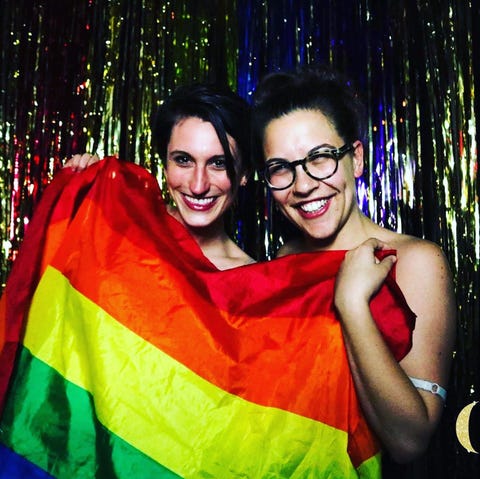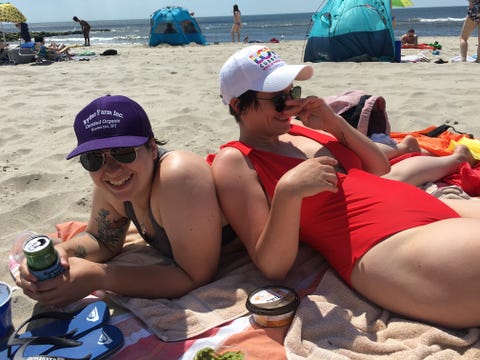The first time I cried during the pandemic, I was sitting on my future in-laws’ white couch in their Manhattan apartment. My fiancé and I were watching the movie about the guy who realizes the Beatles never happened, so he pretends to be the one who wrote their songs. It’s a great concept but a bad movie, though that’s not what prompted my tears. I don’t think any one thought in particular drove me to sobs that morphed into a panic attack. I remember thinking if I got mascara on the couch, the cleaning service could take a significant chunk out of our wedding savings. It was the night after WHO declared the coronavirus a pandemic, and though it hadn’t been a shock, the result of the news was me, here on this incomprehensibly expensive couch, trying to breathe through my sobs.
After ensuring the couch remained stainless post-panic session, my life became about tasks. I helped my fiancé prep for minor surgery, called the rental car company so we could leave the city as soon as they were well enough to sit upright, and drove us all the way home to New England. I bought groceries for two weeks and focused on the lists, ticking off the things we’d need for our new life in quarantine. I avoided daily updates unless I had to write about them, and I began to pull away from Zoom calls when I knew my friends would want to talk about COVID. I controlled the evenings’ movie selections with “light” romantic comedies, and took on writing assignments about Netflix reality dating shows so I’d have to watch mindless things “for work.”
I kept my COVID-related media rotation small: The New York Times, one local news source, and Staying In with Emily & Kumail, a podcast about quarantine hosted by married creative team Emily V. Gordon and Kumail Nanjiani. On episode five, “2Fast2Serious,” Gordon and Nanjiani read a letter from a listener who describes their “grief” in the time of COVID-19. The kind of grief the world is experiencing right now, Gordon says after reading the letter, is similar to what parents go through when when they find out their kid is queer. “When your child turns out differently than you imagined, which I think is true for parents when their kids come out sometimes, there’s a period of grief, not because you don’t want this kid to be who they are, but because you had pictured something else in your head,” she says.
As Gordon spoke, I saw my dad seven years ago, at a folk music festival where, under the influence of a couple beers, I told him I wasn’t straight. He said he “got it,” and I was “going through a phase.” We didn’t talk about it again until I called home two years later to say I was dating my first girlfriend. Then it seemed to hit him—maybe this wasn’t college experimentation after all.
When I got around to telling my mom, she already knew, likely thanks to my father, and interrupted every request I made to talk with a list of things she had to do. She ducked into the laundry room to escape our conversation so many times, I thought every item of clothing in the house would disintegrate. It took a year for me to tell her. What she said when I finally came out to her—that she loved me but could I please keep wearing dresses like Portia de Rossi—was hardly the difficult part, though she had a textbook understanding of how society expects femme women to dress.
I’m one of the lucky ones. After I told my parents I identified as queer, they continued to tell me they loved me, helped pay my rent, and kept me in food until I finished college. I never had to worry about financial insecurity as a result of coming out. But there was an adjustment period I never understood. Why did it take them years to come to terms with who I was? Why did it take such mental gymnastics to accept the fact that their daughter wouldn’t be marrying her high school boyfriend? I was still me; I was just sharing a little more information about myself. Why was it three years before my mom admitted she’d been grappling with the fact that she’d never have a son-in-law? And when I came home to get over a breakup with my first girlfriend—my first love—why did I get the sense from my family that I wasn’t allowed to be sad?
I’ve been mad about this for years. Sure, I’ve worked it over in therapy like a piece of sticky clay. I’ve moved on. I’ve introduced my parents to the person I’m going to marry, whom they love and with whom my dad pals around at his favorite hometown bars. But I’ve never been able to empathize with them until now. When Gordon compared COVID grief to that of a parent learning their child is queer, I realized my recent habits weren’t different from what my parents did when I came out. I make lists and manage the things I can control. In March, I invented the stories I wanted to hear—surely this whole thing would last two months, surely my fiancé would get their job back—and tried to ignore the rest. Talk of the subject made me nervous, just as the topic of my sexuality had been uncomfortable for my parents.
I still don’t know how to respond when it comes to this pandemic. I know now that it’s not going to end any time soon. I know my fiancé isn’t going back to work in the near future, and any significant travel we had planned is off. I know taking a day off from my freelance work means forfeiting money I need to save during a recession. And I know that, when it comes to my mental health, I’m not okay. But I don’t want to think about any of that. I don’t want accept that my wedding next year might not look like I’d always imagined—with every member of my large chosen family present. I don’t want my idea of the future to change.
My parents and I differ on a few things—currently, political opinions and CDC guidelines—but this pandemic has, despite all its negative qualities, enlightened our relationship. I now understand how shocked they were when their daughter, who used to like princesses and Barbies, told them that indeed, she liked princesses and Barbies. They’d never been privy to the sleepovers I hosted with all my dolls in the same bed, while Ken hung out in the Dreamhouse pool for days. What came as no surprise for me was, for them, the plot twist of a lifetime.
As I write this, I’ve just returned home from running mundane errands with my mask secured tightly over my face. I ran into a group of friends, and we stood around on the sidewalk nervously chattering about nothing. When I got home, I got a text from one of them: “Seeing you just now made my brain short-circuit,” she wrote.“I don’t know how to be a human anymore.” None of us know what we’re doing. This wasn’t supposed to be happening. This isn’t normal, though every day, government officials and health professionals tell us it’s the “new normal.” And what many of us are feeling right now, as a result, is grief. “It’s okay to feel grief for something that is lost, even knowing the reasons you lost it are valid,” Nanjiani told Gordon. That’s when my understanding of my parents’ mindset seven years ago clicked in.
My parents weren’t expecting to have a gay kid. They weren’t expecting me to inform them of a new normal. I know that now. I also know that the way I’m treating myself during this pandemic—gently and with patience—is the way I wish I’d treated them then. Seven years later, I know what it means to live comfortably in your assumptions without considering another reality. Rewriting the rules is scary. Learning new things is scary. Mom and Dad, I’m sorry for not seeing that then.
Now, please wear your masks so you can walk me down the aisle next year.
This content is created and maintained by a third party, and imported onto this page to help users provide their email addresses. You may be able to find more information about this and similar content at piano.io

